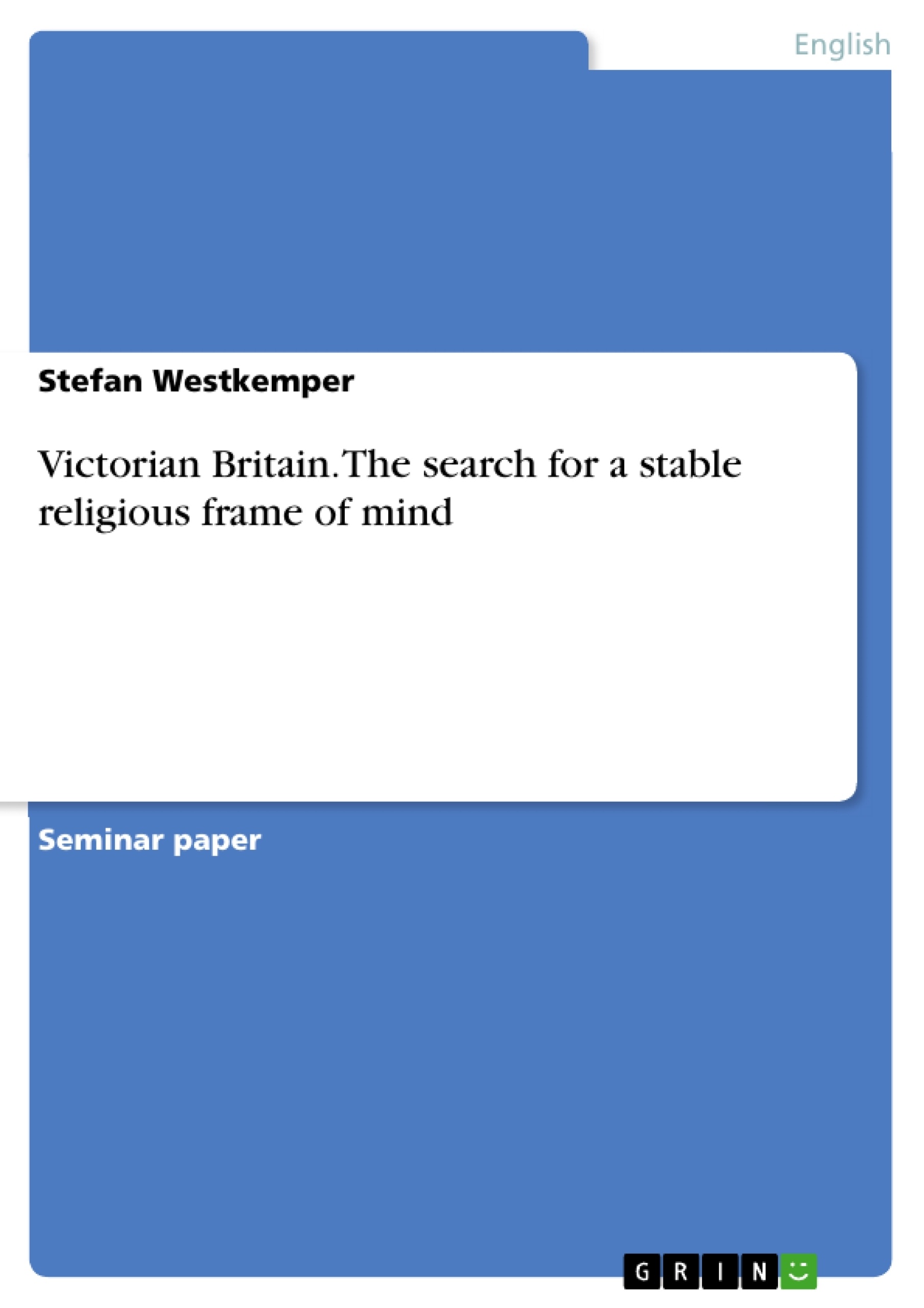From today’s point of view the society of 19th century Victorian Britain is ei-ther regarded as having been secular or, indeed, very religious. Both claims have their shortcomings and neither conveys the whole and true complexity of Victorian society. The former claim that it must have been a secular society seems to be highly influenced by contemporary – i.e. secular – views on society focussing mainly on scientific progress. The latter claim concerning the reli-giousness of Victorian society is especially popular among scholars studying that period who often focus strongly on religious aspects. However, the majori-ty accepts the view that it is a combination of both aspects. Yet, it remains un-clear or vague and hard to grasp what the people in Victorian Britain thought about their own times. There are quite a few books which deal with the state of mind of certain individuals. However, there are only few books which connect the different notions of the Victorian mind on a broader level. Further research on this specific field of study seems to be necessary.
This paper will focus on the Victorian frame of mind at the beginning of the 19th century and will to answer the question what the Victorian mindset actually looked like. I will examine whether it was in a stable condition or whether it was not and what people were concerned with. Therefore, the paper will mainly deal with questions about religious aspects and its opposites. In doing so, the role of religion, the state, and the industrialisation have to be tak-en into account as they had the biggest effect on the Victorian mind. I will show how the different classes of British society reacted towards new ap-proaches of critical thinking about the world and whether they embraced or rejected them. Furthermore, I will look at one possible explanation for the emergence of a critical mindset. The French Revolution will serve as an exem-plary case which heavily influenced the thinking of British liberal intellectuals. Finally, the conclusion will summarise the major findings on the Victorian state of mind and answer the question of its stability.
Inhaltsverzeichnis (Table of Contents)
- Introduction
- The Victorian State of Mind
- General Aspects
- Religious Belief in the Upper Class as a Model of Resistance towards Change
- Scientific Progress and its Effect on the Class System
- The Zoo as an Example of Popular Scientific Enquiry
- External Influences on the Victorian Mind
- The Impact of the French Revolution
- Conclusion
Zielsetzung und Themenschwerpunkte (Objectives and Key Themes)
This paper aims to examine the Victorian frame of mind at the beginning of the 19th century, specifically focusing on its stability and what concerns Victorians held. The paper will explore the Victorian state of mind by considering the roles of religion, the state, and industrialization.- The stability of the Victorian frame of mind
- The role of religion in shaping Victorian society
- The impact of scientific progress on the class system
- The influence of the French Revolution on Victorian intellectuals
- The relationship between church and state in Victorian Britain
Zusammenfassung der Kapitel (Chapter Summaries)
Introduction
This chapter introduces the topic of the Victorian frame of mind, presenting it as a complex issue with differing interpretations. It argues that the Victorian period was marked by both secular and religious influences, and that further research is needed to understand the full complexity of the Victorian state of mind.The Victorian State of Mind
This chapter sets the context for understanding the Victorian state of mind, highlighting the era's rapid progress in science, technology, and knowledge, as well as its revival in faith and belief. It introduces the notion of a constant flux in Victorian society, where "truths" were relative to specific moments in time.General Aspects
This chapter explores the notion of stability within the Victorian state of mind, noting that it was characterized by a constant change and a lack of certainty. It explores the Victorian embrace of various beliefs, including God, religion, science, and reason, but acknowledges that these beliefs were often "shaky" and individuals "passed through" them.Religious Belief in the Upper Class as a Model of Resistance towards Change
This chapter focuses on the upper class's resistance to modernization and secularization. It highlights their reliance on a traditional view of a God-given order of society and their view of the Church as the spirit of the state. The upper class saw industrialization and scientific progress as corrupting the traditional order.Scientific Progress and Its Effect on the Class System
This chapter examines the impact of new scientific discoveries and publications on Victorian society, looking at the works of Charles Darwin, Lamarck, and others. It explores the opportunities for different classes to engage with scientific knowledge.Schlüsselwörter (Keywords)
The key concepts explored in this paper include the Victorian frame of mind, religious belief, scientific progress, industrialization, class system, the French Revolution, the Church of England, and the relationship between church and state. The paper focuses on understanding the complexities of the Victorian period and the factors that shaped its intellectual and social landscape.- Quote paper
- M.Ed. Stefan Westkemper (Author), 2009, Victorian Britain. The search for a stable religious frame of mind, Munich, GRIN Verlag, https://www.grin.com/document/272402




